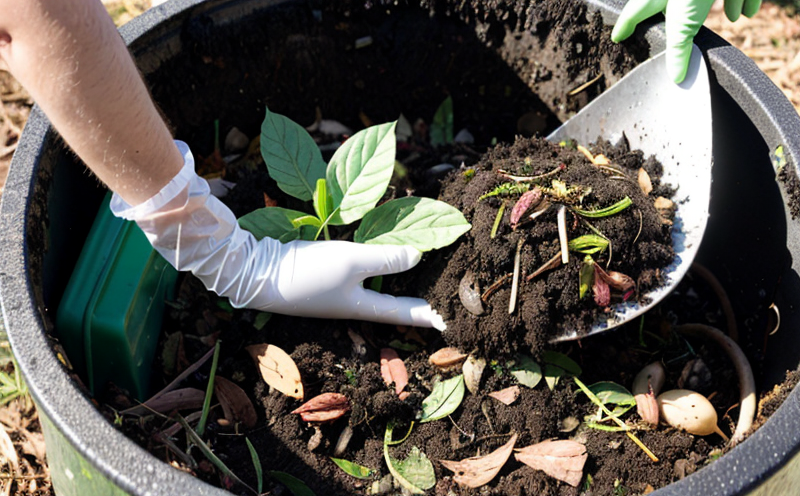ASTM E2170 Microbial Enumeration in Compost Samples
The ASTM E2170 standard practice is a critical component of waste management and compost quality assurance. This method provides structured guidelines for the enumeration of microorganisms, specifically aerobic mesophilic bacteria, fungi, and actinomycetes within compost samples. It ensures that compost products meet regulatory standards for safety and efficacy in various applications such as soil amendment.
The process involves detailed sample preparation which includes homogenization and dilution to ensure accurate microbial enumeration. The method specifies the use of specific media types like Tryptic Soy Agar (TSA), Malt Extract Agar, and Potato Dextrose Agar for cultivation of bacteria, fungi, and actinomycetes respectively.
The enumerated microorganisms are then counted using direct plating or spread plating techniques. The standard also includes the use of incubation conditions that promote growth of specific microbial groups under controlled temperature and humidity levels to enhance accuracy.
Compost quality is a crucial factor in waste management practices, as it affects soil health, plant growth, and overall ecosystem balance. ASTM E2170 helps ensure that compost used for agricultural or landscaping purposes meets the necessary safety standards set by regulatory bodies like the Environmental Protection Agency (EPA) and the European Commission.
By adhering to this standard practice, laboratories can provide reliable data on microbial content within compost samples, which is essential for maintaining consistent quality control measures. This information aids in decision-making processes related to product certification and compliance with international standards such as ISO 17265-3.
| Microbial Group | Media Used | Incubation Conditions |
|---|---|---|
| Aerobic Mesophilic Bacteria | Tryptic Soy Agar (TSA) | 30°C ± 1°C for 24-48 hours |
| Fungi | Malt Extract Agar | 25°C ± 1°C for 7 days |
| Actinomycetes | Potato Dextrose Agar | 30°C ± 1°C for 7-14 days |
The application of ASTM E2170 in compost testing is particularly beneficial because it allows laboratories to perform accurate and consistent microbial enumerations. This ensures that the end products are safe, effective, and meet regulatory requirements.
Understanding the scope and importance of this standard practice helps stakeholders appreciate its role in ensuring high-quality compost for various applications including agriculture, horticulture, and landscaping.
Industry Applications
- Agriculture: Ensuring soil health through safe and effective compost usage.
- Horticulture: Supporting plant growth with high-quality compost materials.
- Landscape Management: Improving green spaces with sustainable waste management practices.
- Environmental Protection: Reducing landfill waste by recycling organic matter into valuable compost products.
| Application | Benefits |
|---|---|
| Agriculture | Enhanced soil structure and fertility, reduced need for chemical fertilizers. |
| Horticulture | Improved root development in plants leading to better yields. |
| Landscape Management | Cost-effective and sustainable maintenance of green areas. |
| Environmental Protection | Decrease in landfill waste while increasing resource efficiency. |
The ASTM E2170 standard is widely used across these industries to ensure the safety, efficacy, and quality of compost products. By adhering to this practice, laboratories contribute significantly to maintaining environmental sustainability goals through effective waste management practices.
Quality and Reliability Assurance
- Accurate microbial enumeration using standardized methods.
- Precision in sample preparation ensuring consistent results.
- Adherence to international standards for reliable data reporting.
- Use of validated media types and incubation conditions for accurate growth.
- Compliance with regulatory requirements enhancing product safety.
The ASTM E2170 method ensures that laboratories can provide consistent, accurate results that are crucial for quality control in compost production. This standard practice not only enhances the reliability of test outcomes but also promotes trust among industry stakeholders by ensuring compliance with international standards such as ISO 17265-3 and EPA regulations.
By implementing ASTM E2170, laboratories demonstrate their commitment to excellence in microbial testing, which is essential for maintaining product quality and safety.





